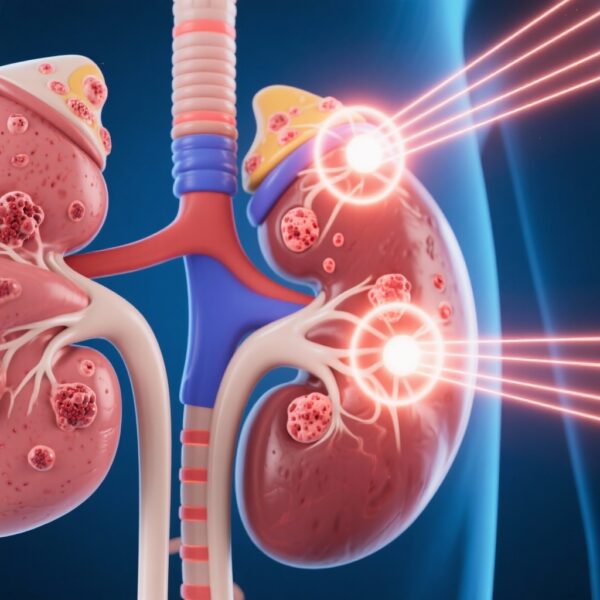Highlight
– The combination of tislelizumab (an anti-PD-1 monoclonal antibody), lenvatinib (a multikinase inhibitor), and GEMOX chemotherapy demonstrated a 63% R0 resection rate in unresectable locally advanced biliary tract cancer (BTC).
– The regimen achieved manageable toxicity without treatment-related deaths, with neutropenia as the most common grade 3-4 adverse event.
– This study provides evidence supporting a potentially effective conversion therapy strategy to increase surgical eligibility in BTC patients previously considered unresectable.
Study Background
Biliary tract cancers, including intrahepatic cholangiocarcinoma, perihilar bile duct cancer, and gallbladder carcinoma, represent a heterogeneous group of aggressive malignancies that often present in advanced stages. Median overall survival with conventional chemotherapy remains poor, and many patients are diagnosed with unresectable disease, precluding potentially curative surgery. Given that surgical resection with negative margins (R0) remains the only curative treatment, strategies to downstage tumors and convert unresectable cases to resectable are urgently needed. However, no standard conversion regimen has been established, particularly in China, where the disease burden is significant. Immunotherapy combined with targeted agents and chemotherapy has shown promise in advanced BTC but has not been widely investigated as conversion therapy.
Study Design
The ZSAB-TransGOLP trial is a single-arm, multicenter, prospective phase 2 study conducted in two centers in China. Eligible patients were aged 18 to 70 years with locally advanced unresectable biliary tract cancer, Eastern Cooperative Oncology Group performance status 0–1, Child-Pugh A liver function, and a life expectancy exceeding three months. The intervention consisted of three cycles (21-day cycles) of:
– Tislelizumab 200 mg intravenously on day 1
– GEMOX chemotherapy: gemcitabine 1000 mg/m² intravenously on days 1 and 8, oxaliplatin 85 mg/m² intravenously on day 1
– Oral lenvatinib 8 mg once daily
Tumor resectability was reassessed every three cycles by a multidisciplinary team. Patients eligible for R0 resection proceeded to surgery. Those remaining unresectable after six cycles entered maintenance therapy with tislelizumab and lenvatinib until one year of treatment, progression, toxicity, or other investigator-defined reasons. The primary endpoint was R0 resection rate.
Key Findings
Between December 2021 and July 2023, 52 patients were screened, and 41 were enrolled and treated. Baseline characteristics included a median age of 58 years, with roughly equal sex distribution. The median number of GOLP cycles administered was three.
– Surgical conversion: 28 of 41 patients (68%) underwent surgery.
– R0 resection rate: 63% (26/41; 95% CI 47–78).
– Median follow-up: 19.5 months.
Safety profile:
– All patients experienced at least one treatment-related adverse event (TRAE).
– Grade 3-4 TRAEs occurred in 49%, most commonly neutropenia (34%).
– Serious TRAEs occurred in 10%, including neutropenia (7%) and thrombocytopenia (2%).
– No treatment-related deaths were reported.
This R0 resection rate is notably higher than historical controls for conversion therapy in this setting, suggesting robust antitumor activity of the combined regimen.
Expert Commentary
This study represents a meaningful advancement in the challenging arena of unresectable biliary tract cancers. The combination of immune checkpoint inhibition (tislelizumab) with targeted antiangiogenic therapy (lenvatinib) and cytotoxic chemotherapy (GEMOX) exploits complementary mechanisms to improve tumor control. The observed R0 resection rate compares favorably to prior conversion regimens and supports incorporation of immunotherapy-based combinations in BTC treatment paradigms.
Nevertheless, as a single-arm phase 2 study, definitive comparative conclusions await randomized trials. The relatively small sample size and exclusive enrollment of Chinese patients may limit generalizability. Close monitoring for myelosuppression and other toxicities remains critical. Future studies should also clarify optimal duration and sequencing of therapy and explore predictive biomarkers.
Conclusion
The ZSAB-TransGOLP phase 2 trial demonstrates that conversion therapy with tislelizumab, lenvatinib, and GEMOX is feasible, safe, and leads to a promisingly high R0 resection rate among patients with unresectable locally advanced biliary tract cancer. This approach has the potential to increase the fraction of BTC patients eligible for curative surgery and improve long-term outcomes. Larger randomized studies and longer follow-up are warranted to confirm these findings and optimize patient selection.
Funding and Clinical Trials Registration
This study was supported by the Program of Shanghai Academic Research Leader, the Key Disease Joint Research Program of Xuhui District, Shanghai Health Commission Clinical Research Special Project, China Postdoctoral Science Foundation, National Science and Technology Major Project of China, the Outstanding Resident Clinical Postdoctoral Program of Zhongshan Hospital affiliated to Fudan University, National Natural Science Foundation of China, and the Shanghai Sailing Program. The trial is registered at ClinicalTrials.gov (NCT05156788) and is currently ongoing but closed to recruitment.
References
Shi G, Huang X, Li X, Liang F, Gao Q, Zhang D, Lu J, Ji Y, Hu Z, Chen Y, Qiu S, Yi Y, Zhu X, Sun H, Shi Y, Peng M, Wang X, Huang C, Ding Z, He Y, Shen Y, Xu Y, Xiao Y, Hu J, Zhou J, Fan J. Conversion therapy of tislelizumab plus lenvatinib and GEMOX in unresectable locally advanced biliary tract cancer (ZSAB-TransGOLP): a multicentre, prospective, phase 2 study. Lancet Oncol. 2025 Oct;26(10):1334-1345. doi: 10.1016/S1470-2045(25)00376-6. Epub 2025 Aug 29. PMID: 40889502.



